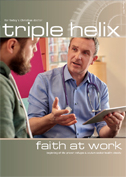Knowing God: our Father the Holy King
Our Father in heaven,hallowed be your name. (2)There is a wonderful (probably apocryphal) story about Abraham Lincoln. He gave his son a pet goat (naturally), which he harnessed to a kitchen chair and regularly rode through the White House. One day, after Lincoln had been delayed over an hour for a meeting with his civil-war officials, the doors burst open and Lincoln Jr charged through the room, propelled by said goat. The President's response? He leapt from his chair, whooping with delight, chased him out of the room and didn't return for another hour.
This access of son to father lies behind Jesus' opening words. Just ride on in with your goat! The point is that God delights in his children. Yet, often we imagine our lives are insignificant. God may be generally interested, but details? What are my joys, troubles or struggles when there's a universe to run? Jesus, though, won't allow this - he insists we call God 'Father'. As we trust in Christ, his standing before God becomes ours. We are drawn into the life of the triune God as he gives us the Spirit of adoption so that we cry 'Abba', (3) calling the Son's father, 'our Father'. (4) This is prayer driven by our adoption as God's child. He is neither distant nor unpredictable, because he delights in us. (5) Will this vision of God draw you to your knees?
Pause here though. Hearing this can leave us imagining God on the same scale as us, a (super)human father, just bigger and better. If that's the case then prayer becomes talking to someone who, however powerful, is still a bit like us.
That might not sound like much of a problem. After all, doesn't prayer itself assume we can talk to him as we would anyone, anytime, anywhere? Again, Jesus won't allow this. After the astonishing opening, the first half of his prayer is saturated with God's 'otherness'. This is an unfashionable picture of God - God on a different scale entirely - the God whose name is to be hallowed. When we pray we tread on restricted-access hallowed turf. He is utterly holy, pure, even unapproachable. So we are praying that he be treated with the respect he deserves as Isaiah's thrice-holy God, (6) as John's exalted king. (7) He is not a bigger version of ourselves, into whose presence we may simply wander. He is the only being in the universe who depends on no one and nothing else, but on whom the whole of creation depends completely.
This bigger vision of God must fuel our prayers. Then combine this otherness with his fatherly nearness and the effect is breathtaking. This utterly-holy, entirely-independent, all-powerful, uncreated-creator of the universe… we call him 'Father'.
Knowing ourselves: dependent and forgiven
Give us today our daily bread.
And forgive our debts, as we also have forgiven our debtors. (8)
Right knowledge of God leading to right self-knowledge is the theme for the second half of the prayer. (9) While the camera has been zoomed in on God's majesty, now we zoom out a little and glimpse ourselves knelt before him.
It's a humbling picture for self-sufficient high achievers, as healthcare professionals tend to be. First, we are dependent creatures praying for daily bread, everything we need today, every day. This is easy to forget. We work hard, open savings accounts, invest in pensions, swallowing the illusion of self-sufficiency. But who enables it? Who gives 'life and breath and everything else?' (10) As we pray, we need a smaller vision of ourselves as dependent creatures.
Second, we are dependent debtors. We're all too familiar with debt nowadays; student debt, government debt, NHS debt; but the big question is, how much? When Jesus confronts us with this, do we really hear the depth of our spiritual bankruptcy? We owe God an unfathomable debt for our declaration of independence from our rightful Holy King, living as though we do not need him, but how can we repay? Everything we have and are is his in the first place.
Here, then, is the twofold vision that should drive our prayer; God, all-powerful, independent, approachable as Father; and us, dependent children, subjects of the Holy King, creatures of the uncreated-creator, sinners forgiven by the gracious Saviour.
Matt Lillicrap is a former medical registrar and is now a theology masters student at Oak Hill College in London.
































